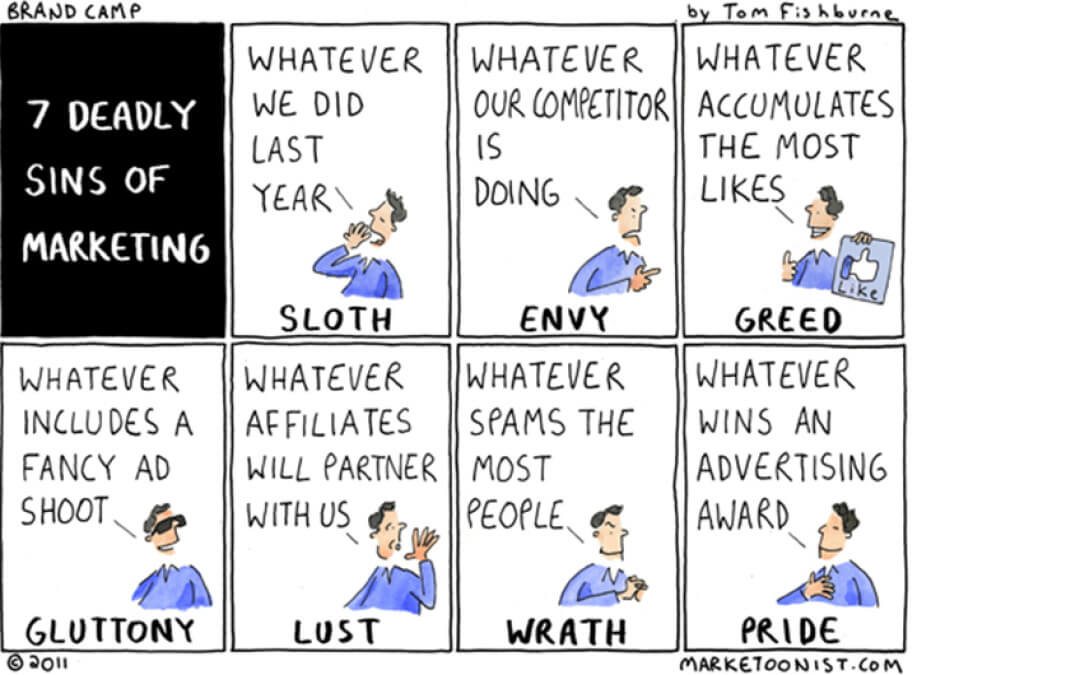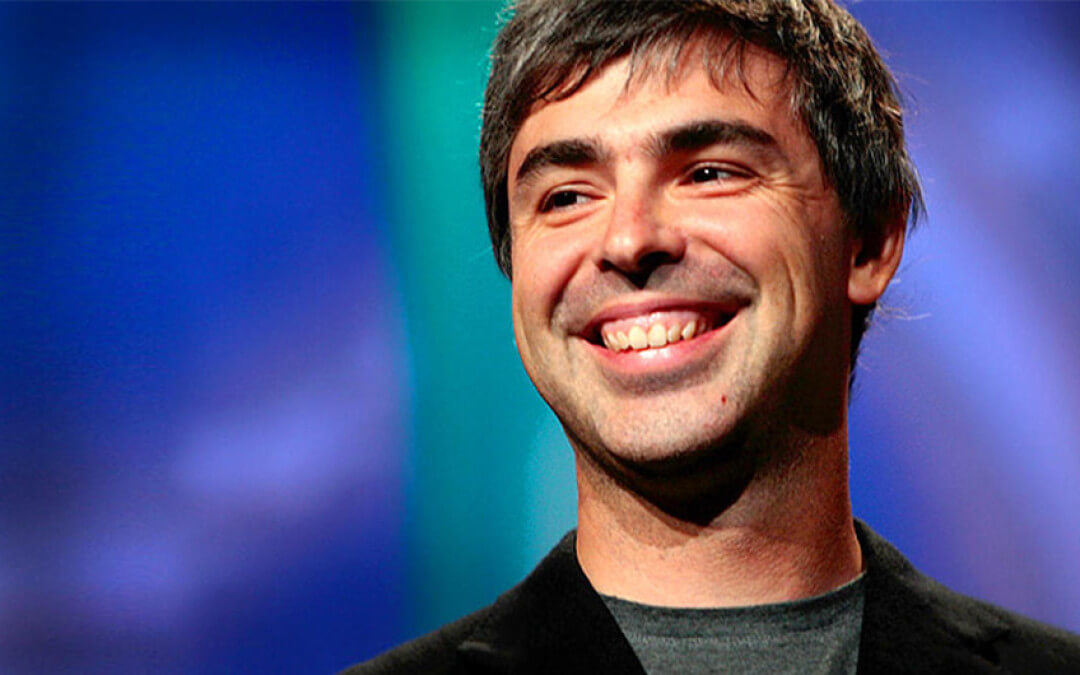Blog

How Strongly Do People Want Your Brand to Be Meaningful?
Based on our conversations with brand-owners (including our own clients), brands need to work harder than ever. There are many reasons for this. Brands want to get their employees aligned to a new vision, but their employees are unengaged. Brands want to attract new customers, but can’t find ways to break through the clutter. Brands want to hire good people, but don’t seem to attract people with passion. This list (which goes on and on) speaks to the gap between a brand’s rational business needs and the emotional human desires of people. When brands are self-absorbed, stuck...
Read more >
Why Brand Strategy Needs to Start in the C-Suite
For brand strategies to have any real traction, they need to be born – at least in spirit – in the C-suite. Here are three reasons why: 1. Capture and reflect vision The leadership team sets the vision for the enterprise. This vision informs the tone and spirit of the brand strategy. 2. Engage senior management ownership A new brand strategy is a moment of transformation for the company. As active participants in the development of the brand strategy, senior leadership takes an ownership position in this change process. 3. Signal senior management buy-in When it is well known...
Read more >
The Eighth Deadly Sin of Marketing
Image by Tom Fishbourne. The eighth deadly sin is “indifference”. Indifference to the changing values, needs, interests and aspirations of the people formerly known as consumers. Indifference to their need to be connected to meaningful ideas. Indifference to their desire to do meaningful things.Indifference to the fact that people matter more than budgets, promotions, social media, etc., etc. In our paper, “The Meaning Gap”, we explore how the interests of businesses, and the people formerly known as employees, are going in separate directions. We also explore the consequences...
Read more >
Is Your Brand’s Biggest Threat…Your Brand?
Someone once asked Larry Page what presented the single biggest threat to Google. “Google”, he said. That’s right. Larry Page believes his own company is a threat unto itself. Is your brand’s biggest threat… your brand? It is, if people don’t understand why your brand matters. It is, if people don’t feel your brand is emotionally important. It is, if by “people” you mean not only your customers, but also your employees, partners, suppliers…indeed all the people vital to your brand’s success. Turn what might possibly be...
Read more >
Branding in a World Full of Screens
A world full of screens Joel paints a picture of a world that’s filled with screens – far more than the four business currently focuses upon: “The basic dilemma for marketers is this: there are now too many screens to count. Set aside PCs, tablets, smartphones, and TVs (connected or otherwise), for a moment. Your car, your thermostat, your washer and dryer, your refrigerator are all on their way to being “smart” as well – connected to the internet and to each other, featuring screens that offer up all sorts of information, from usage data to content, like a fridge that suggests recipes based...
Read more >
Does Your Business Need a Brand Narrative?
Here we explore the brand narrative as a key element of brand strategy, by explaining what constitutes a brand narrative, demonstrating how it supports the overall brand strategy, and showing the brand scenarios which call for a strong brand narrative. What is a brand narrative? A brand narrative is a central building block of a meaningful brand strategy. It is built upon the insights and information gleaned during the kickoff process, with a particular focus on the business-related shifts the brand seeks to make. A brand narrative contains four elements: Truths – four or five...
Read more >Using Company Values to Build Engagement and a Meaningful Workplace
“People may not remember exactly what you did, or what you said, but they will always remember how you made them feel.” – Maya Angelou The goal of employee engagement is to drive employee attitudes, behavior, morality, and ethics in such a way as to improve their productivity, morale, satisfaction, and usefulness within the organization. However, many companies have struggled with converting their proclaimed values into compelling, work-changing experiences for their employees that reach through to their brand strategy. Often, the problems have been that the values are typically...
Read more >
Brand Promise: The What, Why, and How of Great Brand Strategy
There’s a lot of talk about the concept of brand promise. But, what is a brand promise? Why does my business need one? How would it make my business stronger? How does it relate to my brand strategy? Here we explore the answers to these pressing questions. What is a brand promise? And perhaps more important, what kind of a brand promise does your business need in today’s world? A brand is a promised delivered. A contemporary brand promise articulates an idea that goes beyond the rational benefits that worked in the past, and extols a higher-order emotional reward. A brand promise is...
Read more >
Connecting the Dots Between Brand Strategy and Brand Moments
In one of our white papers, “Brand Behavior Drives Results”, I write about how emotive branding extends from high-level aspiration (that is needed for differentiation and appeal) to down-in-the-trenches action (that is needed to generate ideas, product,s and profits). Rather than being precious about the strategy element of our offering, we seek true brand transformation by delving deep into the interactions between your brand and the people vital to its success. We dig in, get our hands dirty, and invest considerable time in deconstructing the many ways in which your brand and...
Read more >
Your Brand Strategy for the Purpose Economy
According to Aaron Hurst, we are moving from the Information Economy to the Purpose Economy. He states that this is a natural evolution, which is taking us from the first levels of human organization, the hoe-and-plow Agrarian Economy, through the smokestacks of the Industrial Economy, to the data farms of the Information Economy, and now to the human-centric Purpose Economy. Each of these economies been built on top of the proceeding, and represent evolutions more than revolutions. In his book, The Purpose Economy Hurst states: “When I say purpose, I mean more than serving others and the...
Read more >
B2B Brands Desperately Need Ways to Differentiate Themselves
The pressing need for differentiation in B2B “Features easily blur into other features. It is increasingly difficult to differentiate on a product or service level as competitors find it easy to quickly duplicate innovation. So, where can B2B brands effectively differentiate? We think it’s by connecting to people on a higher level through meaning and feelings.” It is natural for people engineering teams, product teams and product marketing teams to see their B2B product or service as something special, unique, and important. Unfortunately, this makes it all the more difficult for...
Read more >
The One Thing Your Brand Strategy Doesn’t Need
The decision to develop a brand strategy or refresh your brand strategy will be typically driven by a specific need. Either you are just starting out and need to establish your brand, or you’ve found that your current brand strategy is holding your business back. Regardless, it’s critical to ensure your new brand strategy takes your business where you need it to be. Experience shows us that many brand strategies fail because they are inwardly focused. They are myopic in that they lead with product features and benefits and the business’s explicit needs to create growth and increase...
Read more >
How Your “Brand Vibe” Can Change Your Brand’s Fortunes
We humans are very proud of our ability to think rationally. This cognitive power not only lets us understand and use facts, it also helps us build elaborate creations and fantasies. We use our rational brains to conduct business. Cognition helps us sort stuff out, compare options, and rank priorities. Our rational, conscious brain is so “upfront” in our day-to-day work lives that we begin to believe it is our only way of thinking and acting at work. Yet, as neuroscience is finding, it is now clear that this cognitive ability is not a stand-alone factor in how we perceive, sense,...
Read more >
Moving the Needle of Market Share Through Purpose
Creating Market Share Market share is an essential goal for most businesses. Greater share leads to a stronger and more vibrant business. It fuels growth, stimulates innovation, and increases ROI. But is your business having a hard time moving the needle? It’s no wonder. After all, it’s tough out there. Your industry is becoming increasingly commoditized. Pervasive competitors are quickly copying and mimicking your innovations. At the same time, people who have been shook up by the financial crisis, and who increasingly seek values as much as value, are thinking more about what they buy, and...
Read more >
You Need to Hire Great People. But Why Do So Many Bypass You?
New talent is the lifeblood of most companies. Recruits bring in new skills, energy, and passion. They not only help companies deal with what needs to get done, but also discover what can be done. They not only fill leadership gaps, the upgrade the level of leadership within your firm. But the best recruits are quite naturally a demanding lot. They know they are valuable, and from that position they know that they can afford to be discerning about where they choose to work. Increasingly, the bar for companies needing to recruit has been risen, as more and more talent looks for purpose and...
Read more >
